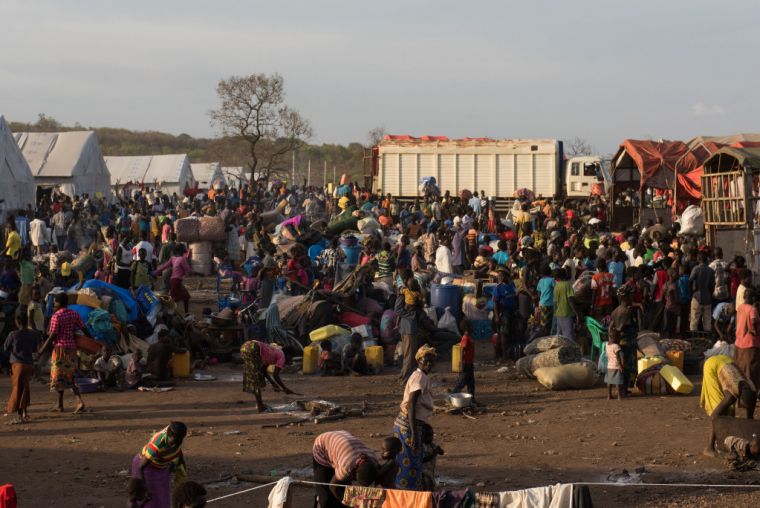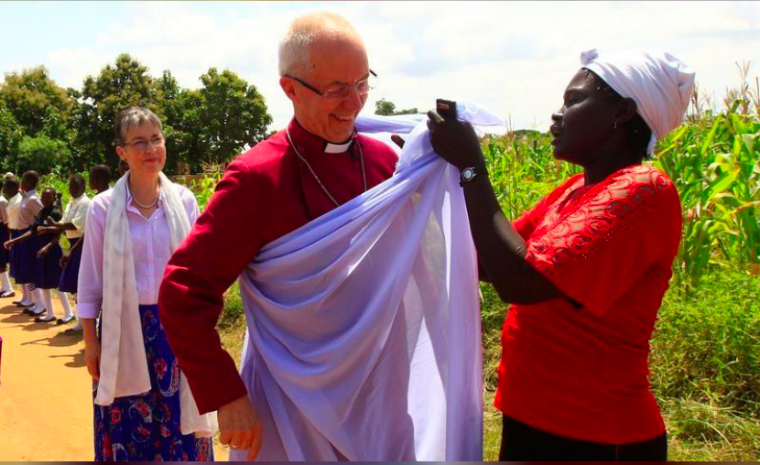'God knows your suffering': Justin Welby prays for South Sudan's refugees in Uganda

The Archbishop of Canterbury, Justin Welby, prayed yesterday with South Sudanese refugees in northern Uganda,which is home to a nearly million fugitives from a four-year civil war in the world's youngest nation.
'The Bible tells us that the refugee is specially loved by God,' Welby said as he joined in prayers in a camp in the northern district of Moyo.
'Which means you who are refugees are specially loved by God, that Jesus himself was a refugee and he loves you and he stands with you and the suffering that you have is the suffering that he knows. So I pray for you, I will advocate for you.'
Welby was warmly welcomed at Moyo by religious leaders, government officials and pupils of Erupi Primary School and students of Erupi Primary Teachers College.

Around 1.8 million people have fled South Sudan since fighting broke out in December 2013, sparking what has become the world's fastest growing refugee crisis and largest cross-border exodus in Africa since the 1994 Rwandan genocide.
Most have fled south to Uganda, whose open-door refugee policy is now creaking under the sheer weight of numbers in sprawling camps carved out of the bush.
Officials from the United Nations UNHCR refugee agency say that $674 million is needed to pay for the basic needs of the refugees this year, but so far only 21 per cent of those funds have been secured.
The total number of refugees is due to pass a million in the next week, UNHCR officials said. Nor is there any sign of a let-up in the stream of desperate civilians. On some days it is only hundreds; on others, it is thousands.
In the camps, refugees are already on half their standard food rations of 12kg of maize a month, and now critical services such as health and education are facing cut-backs, UNHCR officials said.
In Bidi-Bidi, the largest of the refugee camps, 180 South Sudanese died in the first six months of the year, nearly half of them small children.
'We came here to hide ourselves from death,' 31-year-old Moro Bullen told the Reuters news agency, standing next to a row of 16 freshly dug graves, mounds of rust-red earth arranged in three neat rows. Half of the graves were only a metre long. 'We did not come here to die. We came here to be rescued.'
Human rights groups have also reported widespread rape and looting that the UN says indicates ethnic cleansing. It has also warned of a possible genocide in a country that only came into being in 2011, when South Sudan split from Sudan.
The government has denied the reports, and said its troops are merely conducting operations against rebel militiamen.
Writing on his Facebook page, Welby reflected on his time in Sudan: 'I spent a brief time with the bishops of Sudan hearing about their vision for their dioceses,' he wrote. 'I reflected on how the word Emmanuel means God WITH us. Together with partners, we discussed how to help the church in Sudan thrive by working WITH local churches, rather than doing things TO or FOR them.
We had wide-ranging and fruitful discussions with the President, as well as the Foreign Minister, the Minister for Religious Guidance and state ministers.
'We were able to be honest about where we disagreed, and talk positively about hope for Sudan's future, achieving peace and stability in the region, security for churches, and religious coexistence.'
Additional reporting by Reuters.











